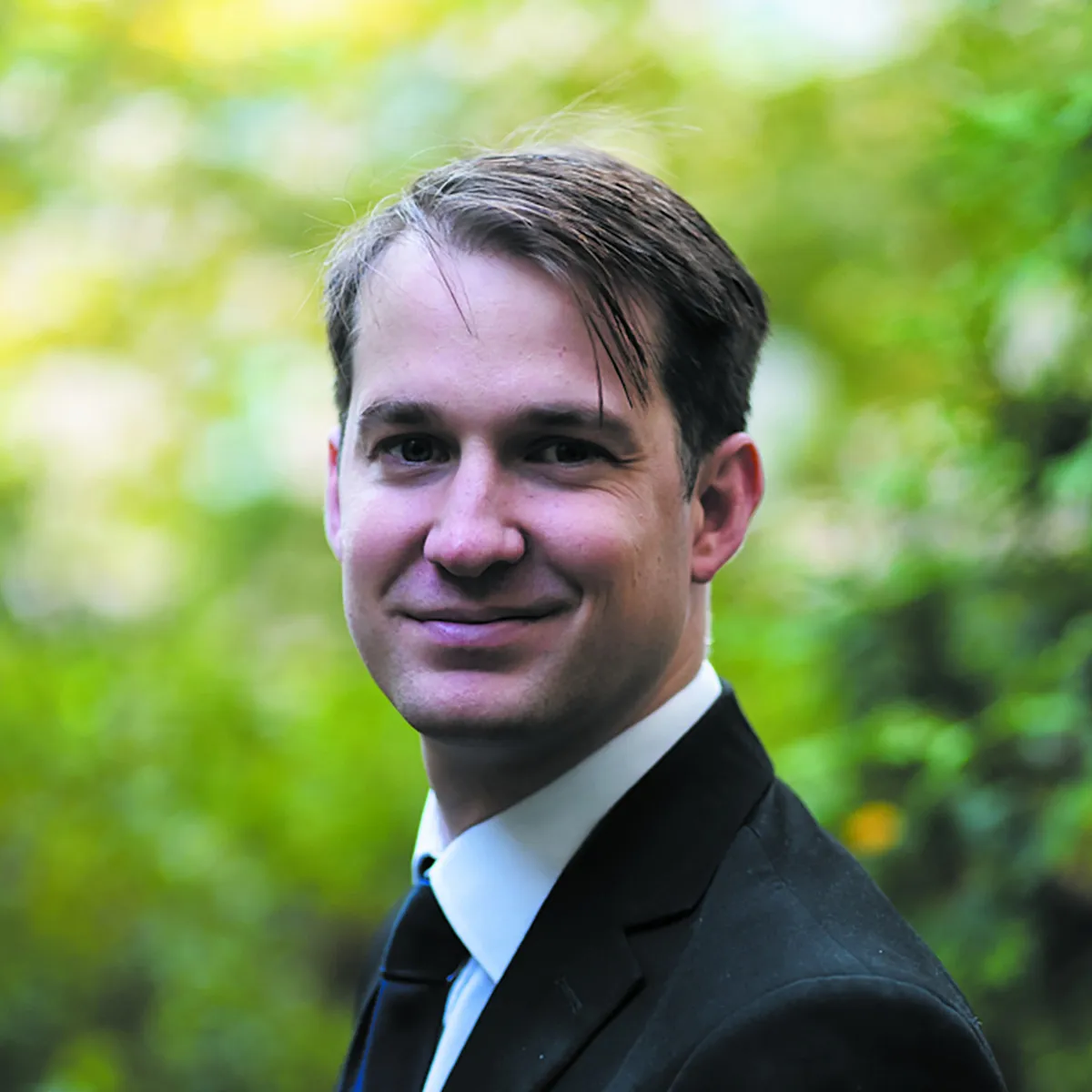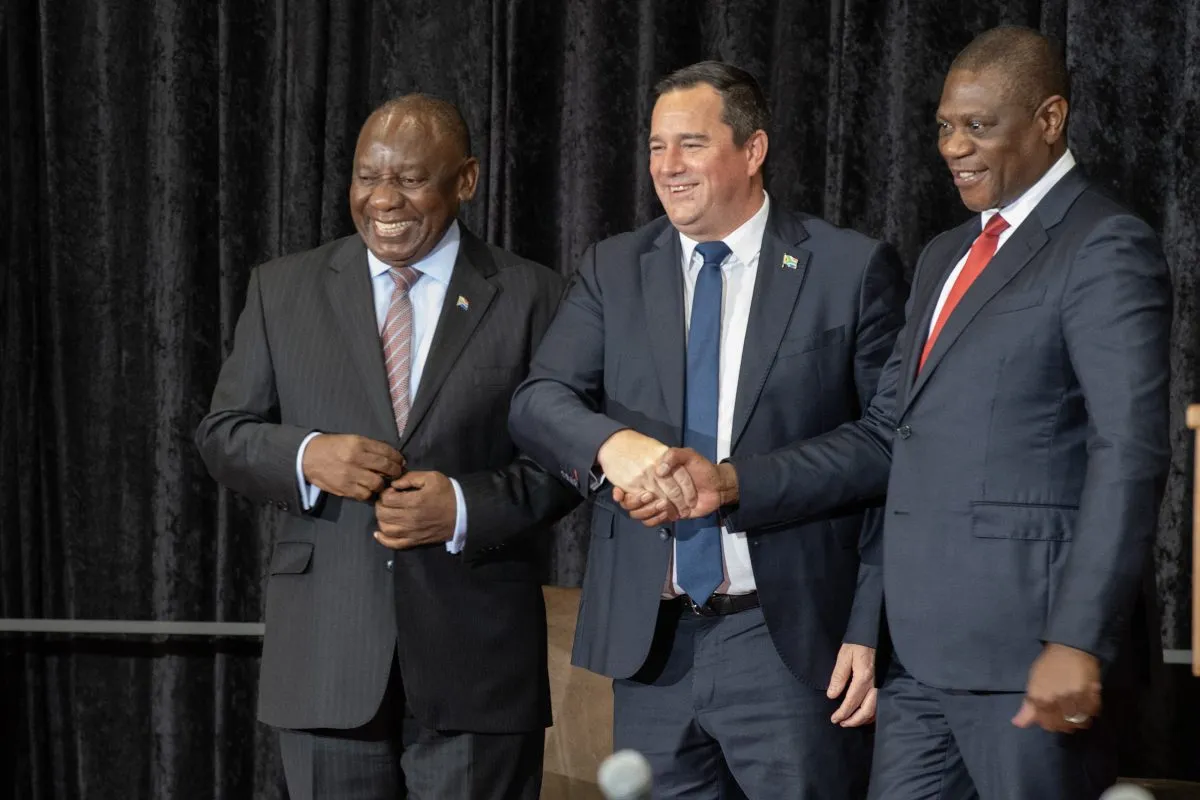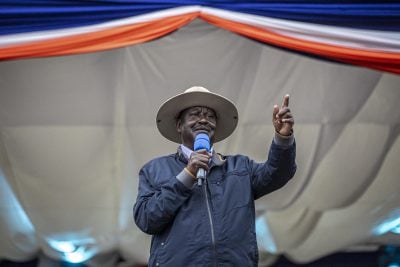On 11 February 1990 Nelson Mandela, newly released from Victor Verster prison after decades of incarceration, appeared on the balcony of Cape Town’s City Hall. Surrounded by supporters in the shadow of Table Mountain, Mandela addressed his people for the first time in years. He announced that he had entered preliminary talks with the apartheid government to normalise the political situation and laid down his demands for the beginning of full negotiations to end the iniquitous system of racial oppression.
“Our struggle has reached a decisive moment. We call on our people to seize this moment so that the process towards democracy is rapid and uninterrupted. We have waited too long for our freedom. We can no longer wait,” he told the cheering crowds.
The long and sometimes painful negotiations that followed – held against a backdrop of racial tension and persistent violence – would ultimately lead to the dawn of freedom, a new era of democratic governance and three decades of uninterrupted electoral dominance by Mandela’s African National Congress (ANC).
On 18 July 2024 the era of sole ANC rule that Mandela helped to usher in came to a close in the same Edwardian building.
Taking to the lectern inside the grand hall, President Cyril Ramaphosa – a key Mandela ally who was holding the microphone for his leader on that day in 1990 – used the state opening of parliament to confirm that for the first time in the fully democratic era, the ANC had agreed to share power with its political opponents at the national level.
“Exactly 50 days ago, the people of South Africa went to the polls to decide the future of our country… Through the votes, they determined that the leaders of our country should set aside their political differences and come together as one to overcome the severe challenges that confront our nation.
“Guided by this directive from the people, political parties from across the political spectrum have elected to establish a Government of National Unity (GNU). In an act that is unprecedented in our democratic history, ten political parties represented here in our Parliament have agreed to craft a common programme to build a better, more equal and more just South Africa.”
The world turned upside down
While Ramaphosa warmly welcomed the GNU’s formation – in which the ANC will share power with its long-time opponents in the right-leaning Democratic Alliance (DA) and with smaller parties – there is no doubt that the outcome was forced on him by the disastrous electoral result of 29 May, in which the ANC secured the support of just 40% of voters, down 17 percentage points on its previous tally.
After decades of ANC rule, South Africans had seemingly decided that the party of liberation was no longer delivering.
The evidence of failure was palpable. With the exception of the Covid-19 recovery year of 2021, the economy has failed to grow at more than 1.9% a year since Ramaphosa took office in 2018, and growth slumped to just 0.6% in 2023. Persistent power cuts were one of the most visible manifestations of the deep rot that had taken hold in power utility Eskom and in other state-owned companies.
Startling inequality
Meanwhile, over three decades into the democratic era, South Africa still has the highest income inequality in the world, according to the latest data available. The “Gini coefficient” is a widely used statistical measure of inequality: a country with absolute equality has a coefficient of zero; and if there were a country in which one person received every last cent it would have an income coefficient of one. South Africa’s income Gini coefficient is 0.67.
The ANC’s inability to deal with the legacies of colonialism, apartheid, and its own history of rent-seeking and corruption had alienated both voters and would-be investors.
Once the electorate had rendered its brutal judgement, Ramaphosa had no choice but to enter a coalition to secure his political survival. The price of that is that the ANC now finds itself in the unprecedented position of having to consult coalition partners on major policy decisions. But if the GNU represents an extraordinary change for the ANC, it is also likely to be a significant culture shock for the DA, its new partner in government. An economically conservative party with solid support in the white community and a history in provincial government, the DA has never been more than a trenchant opposition force at national level.
Both parties, then, are taking a giant step into the unknown.
“It’s quite a historic deal – it’s almost like things conspired to get to this point,” says Ralph Mathekga, a political analyst and author of The ANC’s Last Decade: How the decline of the party will transform South Africa.
“Nobody is happy to be in a coalition, but they found themselves in a situation where they have no option but to embrace it. The ANC fell out with the voters because of service delivery, and with the decline of their electoral base still underway partnering with the DA was their best lifeline. As for the DA, they got 22% of the vote and are stagnant, and this is an opportunity for them to showcase governance on a larger scale. It’s turned South African politics upside down in an interesting way.”
Whether the two reluctant parties in this shotgun marriage can overcome their obvious ideological and cultural differences to work together to renew South Africa is the key question for the future of the nation.
Enemies turned friends
If the two main parties make for unnatural bedfellows, it was Ramaphosa’s job at the opening of parliament to play the contrite statesman, smooth over the differences and offer a vision of governance which broadly reflected the aspirations of all the coalition partners.
“Despite the achievements of 30 years of democracy, and the work undertaken over the last five years to rebuild our economy and our society, millions of South Africans remain poor, unemployed and live in a highly unequal society,” he said.
“For a decade and a half, our economy has barely grown. The circumstances of the South African people today require that we act together as the Government of National Unity and all key role players in our country with great urgency, boldly and decisively.”
Ramaphosa said that the GNU will prioritise three broad areas over the next five years: driving inclusive growth and job creation; reducing poverty and tackling the high cost of living; and building a “capable, ethical and developmental state”. The new cabinet will meet to consider a medium-term development plan, he said, which will translate the priorities into a detailed plan and interventions to be implemented over the next five years.
Daniel Silke, analyst at Political Futures, says that, given the “tremendous amount of leadership goodwill,” at the top of the ANC and DA, the intent of Ramaphosa’s speech was to steer well clear of controversy and lay down basic principles that the parties can agree on.
“The opening of parliament saw Ramaphosa provide broad brushstrokes that were a synthesis of the major political parties’ manifestos. An exercise has been done to try and find common ground and ultimately his speech would have kept everyone on board and ticked all the boxes – infrastructure, reviewing petrol prices, rerating basic goods in terms of VAT – all these are issues that will find favour with the parties, and are intended to cement this GNU in the early days.”
Such agreement is in itself no mean feat. The tense, weeks-long negotiations that birthed the GNU threatened to collapse over the division of cabinet positions – at one point, an outraged Ramaphosa accused DA leader John Steenhuisen of attempting to create a “parallel government” in breach of the constitution, when the party pushed for eight cabinet seats rather than the six that the ANC offered.
Significant portfolios for the DA
The DA ultimately accepted six ministerial posts: the portfolios of home affairs; agriculture; public works and infrastructure; basic education; communication and digital technologies; and forestry, fisheries and the environment.
They will be joined in the 34-strong cabinet by 22 ANC colleagues – including the President and his deputy and those in the key portfolios of finance; energy and electricity; transport; and trade, industry and competition. Six portfolios have been taken by the smaller parties, and the DA have assumed six deputy ministerial positions.
Tony Leon was leader of the DA from 2000 to 2007, after six years as leader of its predecessor, the Democratic Party. He was an advisor to the party during the GNU negotiations, and tells African Business that he believes the deal was the best obtainable for the party.
“I had mixed feelings in the sense that having been so intimately involved in the construction or birth of this ungainly GNU, I thought frankly it was a fairly mediocre deal for the DA, but it was a very good result for the country… If we hadn’t gone into these arrangements, the likely result would have been the [radical leftwing] EFF and [former President Jacob Zuma’s] MK Party going in some combination and that really would have been country catastrophic in terms of their constitutional vandalism, their Hugo Chavez-like economic prospectus,” he says.
Silke concurs. “They’ve put together in remarkably fast time a governmental structure in technocratic form. That’s been accomplished, it’s a plus for the country as it indicates stability, continuity of government, and the alternative would have been a more populist alliance. The centre has effectively been reaffirmed.”
More in common than meets the eye
And yet despite the fact that the coalition has kept the radical wolves from the door, there is also a feeling that both Ramaphosa’s ANC and the DA have more in common that either party would often admit.
Even before the election there were signs that Ramaphosa – himself a multi-millionaire businessman – was moving in a direction more conducive to the private-sector-led growth that the DA has long demanded. The back end of the last administration saw Ramaphosa making attempts to liberalise the power and renewable energy industries and encourage the return of large infrastructure investors.
“They agree on a lot of things – just take the National Development Plan, which they all agree on,” says Mathekga. “There are a lot of low-hanging fruits. The question of electricity for example – the ANC inability to deal with it has little to do with policy indecision – it’s cadre deployment [a form of political patronage] and a lack of skills. I would say on many areas they’ve got ground to work on while they reserve the right to disagree… President Ramaphosa is more DA than anyone else I’ve seen.”
Leon says that the DA “consciously looked at common ground between the parties” and “actually found quite a lot of it if you remove the rhetoric and enmities of decades,” pointing out that the DA has an apparently willing partner in finance minister Enoch Godongwana, head of the pro-business National Treasury, one of the country’s most powerful ANC-held portfolios. He also says the DA stands firmly behind Operation Vulindlela, a joint initiative of the Presidency and National Treasury to accelerate structural reforms and support economic recovery.
Silke agrees that with general agreement on policy already in place, it is rather the potential infusion of scrutiny and accountability that could be the real gamechanger from the GNU. Mathekga says that “markets will love” the addition of skilled opposition MPs to parliamentary committees.
“Before the election there was quite a movement from Ramaphosa to look to the private sector to assist the ANC,” says Silke. “But with a lack of credibility within the ANC to deliver accountable and effective leadership and to implement policy, investors were sitting on their hands.
“This new level of accountability provides the private sector with renewed impetus to look again at South Africa.
“Just the fact that you have DA ministers and deputy ministers in key portfolios, and a more business-friendly party in senior positions, clearly will shift sentiment in favour of private sector investment.”
Culture clash
Alongside the apparent agreement on broad policy areas, the differences that divide the parties could be as much cultural as ideological. Can the ANC, long used to ruling alone, successfully share power with a DA that is congenitally used to criticising its new partners in the harshest terms?
“We’re now at a stage where the various participants are really finding their feet and I think they’re beginning to stretch their role and independence – to what degree will [the non-ANC parties] have leeway in terms of the policy framework and tweaking policy to their ends? This is an unfolding unknown and a process that will probably test the limits of the GNU, by virtue of a party like the DA seeing how far it can go,” Silke says.
Former DA leader Leon is confident that the party’s new portfolios and mechanisms for parliamentary accountability will allow the DA to exert pressure on the ANC and move the government in a direction more conducive to service delivery and economic growth. He believes that the DA can make significant strides in fixing the dysfunctional home affairs department; in encouraging infrastructure investment; and in both “harm prevention” and improving food security in the agriculture ministry, which will be led by DA leader John Steenhuisen.
“Any cabinet portfolio, even in this ungainly supersized government, gives you a delivery mechanism. If the DA can’t make something of six cabinet posts, some of which are reasonably significant, six deputy posts and various committee chairmanships in Parliament, which it’s never had before – then frankly you’ve got to say the party doesn’t cut the mustard. There’s a very big onus on those who are now enjoying the comfort of being inside government to actually prove to their supporters and folk in general that they can make a difference to their lives,” he says.
Need to unlearn habits
Yet he admits that governing in a coalition will be a major challenge for both the ANC and DA.
“The DA will have to unlearn the habits of opposition and be prepared to take collective cabinet responsibility for governance, a lot of which it doesn’t control. Equally the ANC is going to have to learn how to share power; one of the features of negotiations and its results is that the ANC has not really acculturated itself to the fact that it is a 40% party, not a 62% party – it’s got to share power and not just hog it, and that means give and take.”
Silke believes there are potential obstacles in ministries where there is a DA minister with an ANC deputy (or vice-versa), and instances in which DA ministers may run up against a bureaucracy responsible for policy implementation that has traditionally been dominated by the ANC.
And on 25 July, the DA announced that it was still pursuing a court case that it first filed in May after Ramaphosa gave a speech as president that the DA says was party-political. It asks for fines and for the court to deduct 1% of the ANC vote.
Silke also believes challenges are likely to be felt most heavily at the often “dysfunctional” provincial level. Indeed, Leon predicts that basic education will be one of the most challenging ministries that the DA is responsible for, given the dominant role of the provinces in education provision.
Nevertheless, Mathekga thinks that under the ANC, led by “experienced negotiator” Ramaphosa, whose leadership potential is broadly respected by the DA, most challenges can be surmounted. “If the ANC is willing to let the DA run education, that shows a willingness to engage in concessions. I don’t think it’s going to be that difficult for them to find a way to strike a balance – they are likely to proceed on more areas than on those in which they disagree. What matters a lot is those areas that have a direct impact on society – if they can deal with those things, (the GNU) will be able to hold (together),” he predicts.
Winning back investors
The impact that this complex picture will have on investors remains to be seen. But the omens so far are good. “The message from South Africa is that it is ready and open for business, wants to be a building site and there are going to be invitations out for potentially huge amounts of money for infrastructure spend – that’ll be well received by international and domestic business,” Silke says.
“I suspect that having six DA members in the cabinet that are unambiguously on the side of economic reform will strengthen Ramaphosa’s hand rather than weaken it,” predicts Leon.
And yet the scale and duration of South Africa’s challenges means that even if the GNU hits the ground running, it could take a significant amount of time to recover from what many have called a “lost decade” for the country.
Repairing degraded state-owned electricity provider Eskom and logistics giant Transnet are likely to be years-long jobs – and are liable to be slowed by vested interests. Making a serious dent on poor health and education outcomes is also not an overnight fix.
“The recovery is potentially going to take many years, and I don’t think you can expect a dramatic improvement in the short term. But with a willingness to be more open, to cooperate, launch public-private partnerships, to deregulate the economy and bring in skills, you’re looking at the potential for at least a fresh look by investors, commitment of perhaps large-scale funds and projects, and a slow incremental improvement in our GDP as a result,” Silke predicts.
Hanging over all of this is the potential price of failure. Official unemployment stood at 45.5% for those aged 15-34 and 32.9% for the working-age population as a whole in the first quarter of 2024. If the ANC and its long-time opponents cannot together bring about a change in the fortunes of South Africans, the radical political forces that have been marginalised by the coalition deal are likely to undergo a reassessment by the public.
“It this doesn’t work, if the DA position becomes untenable – and I’m not counselling disaster, I hope it works – the alternative will come back on the table and then we’ll be back [where we started] but much worse,” cautions Leon.
“So there’s a big incentive on all sides to make a go of it.”
Want to continue reading? Subscribe today.
You've read all your free articles for this month! Subscribe now to enjoy full access to our content.
Digital Monthly
£8.00 / month
Receive full unlimited access to our articles, opinions, podcasts and more.
Digital Yearly
£70.00 / year
Our best value offer - save £26 and gain access to all of our digital content for an entire year!

 Sign in with Google
Sign in with Google 



